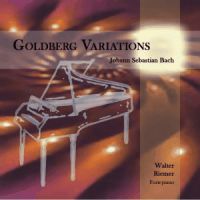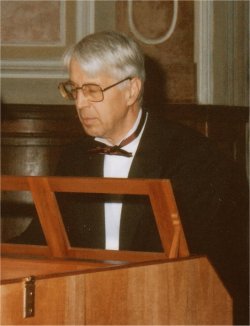

 |
 |
|
  J S Bach played by Goldberg Variations and selection of inventions/sinfonias
Art of Fugue There can be no doubt that the relation between Bach and the fortepiano deserves more attention. We always think of Beethoven demanding innovations in the keyboard instruments he wrote for, yet we hardly consider to what extent Bach responded to such changes around him, and indeed encouraged them. of
Of course we know that Bach played Frederick the Great's collection of fortepianos, on his well-known visit to Potsdam. We have every reason to believe that he would have been interested in hearing his own music on the then new instruments. In addition, there was much publicity surrounding Bach's encounter with the collection. Was it initiated by the instrument maker Sibermann, or by Bach himself, who was at some stage an agent for selling fortepianos?
Can we use ‘stylistic feel' to suggest that the fortepiano influenced Bach in his work also, in the way that an art historian uses deep knowledge of an artist and a period to develop an intuition about authenticity and attribution? Some point to the G major fugue from Book 2 of the Preludes and Fugues as one such example.
This also reminds us, yet again, that authenticity is a moveable feast. A modern pianist might play ‘modern' pianos up to a century old, so to hear Bach's music on a whole range of ‘period' instruments is always illuminating. The main interest of this account of the Goldbergs is musicological. Bach's Goldberg Variations have been adapted for a whole range of instruments and ensembles, including strings and organ, so why not fortepiano?
Walter Riemer is artistic director of a successful chamber music to series at Niederfellabrunn Castle, in the Weinviertel, 'Austria's largest wine-growing area'. There is no doubt that he makes good his claim that the fortepiano gives an interesting, bell-like timbre to the music and the Lehman tuning gives the work an added emotional charge.
I preferred Riemer's playing of the Art of Fugue and the Inventions/Sinfonias fill ups to that of the Goldbergs. The documentation also is far more extensive on the Art of Fugue, the interpretation of which I preferred to Riemer's way with the Goldbergs, some of the variations taken very slowly.
Ying Chang
These discs can be bought direct from Walter Riemer's website and will also be available via Amazon.de next month. Mr Riemer has explained that those slower tempi were deliberate decisions; he had in fact made two recordings of the Goldbergs, one taking some of the music consideraby quicker, before choosing to release this version. But he formed the view that faster traversals of the work - e.g. Glen Gould's, displaying 'etude-like virtuosity' - did not pay fair tribute to the musical contents. Riemer cites variation 26, which he (unlike most others, but like a very few others) sees as a sarabande: 'There is a lot of detail (specially harmonically and therefore in the sound impression) in many variations that gets lost with too fast tempo.' And to illustrate the inexhaustible possibilities within this great work, do not miss reading about one of my own favourite versions, Uri Caine's, reviewed by both YC and PGW; Caine uses a copy of Bach's Silbermann fortepiano, but do not expect anything straightforward from Uri Caine ! [Editor]
|